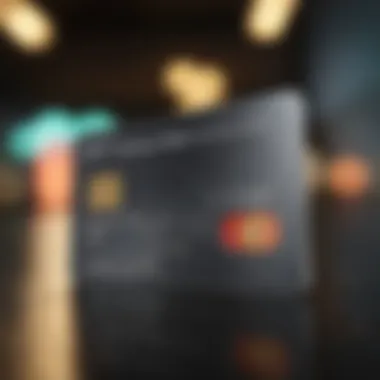Exploring No Credit Check Credit Cards


Intro
Navigating the realm of credit cards can feel like steering a ship through stormy seas, especially when it comes to applications that don't require a credit check. This exploration uncovers a pathway many don’t often tread — the options available when traditional evaluations are bypassed. With credit scores commonly determining eligibility, it's refreshing to know that some financial products can provide a lifeline for those with thin or tarnished credit histories.
In this guide, we’ll dissect what it means to apply for a credit card without the burden of a credit check. We want to arm you with essential knowledge—from understanding key features to outlining the application process, and weighing the pros and cons. By the end, you'll be better positioned to make informed decisions that resonate with your financial goals.
Overview of Financial Product
Definition
A credit card application without a credit check is meant for individuals who might not have solid credit profiles. Instead of standard assessments, these offerings often involve alternative methods of evaluating a potential cardholder's creditworthiness.
Key Features
- Soft Credit Check: Many no credit check cards perform a soft inquiry instead of a hard one. This means it won’t impact your credit score.
- Alternative Data Usage: Credit card issuers may utilize factors such as income or bank statement reviews to assess an applicant's financial habits.
- Less Stringent Approval Criteria: Approval tends to be a bit more accessible, catering to those who might otherwise be shut out of traditional options.
Purpose and Benefits
The primary purpose is to provide credit access to those that haven't yet built a robust credit profile or have faced setbacks in the past. Here are some benefits:
- Rebuilding Credit: Having a credit card can help reestablish credit history if managed well.
- Flexibility: Offers a chance to make purchases or cover emergencies without needing to rely on cash all the time.
- Financial Inclusivity: Enables individuals with poor credit histories to participate in the credit system, potentially leading to better opportunities in the future.
Types and Categories
Credit Card Types
Various kinds of credit cards exist without the need for a credit check. This might encompass secured cards, which require a deposit; or specific store cards linked to retailers, often marketed to individuals with less-than-stellar credit.
Pros and Cons
Pros:
- Accessibility: Easier for people with limited credit history.
- Opportunity for Growth: Can become a stepping stone to better credit options.
Cons:
- Higher Fees and Interest Rates: Often comes with more costs than traditional cards.
- Lower Credit Limits: They may start small to mitigate risk.
Situational Uses
- Starting Out: Ideal for students or young professionals who haven’t built credit yet.
- Financial Recoveries: Helpful for those aiming to recover from financial setbacks such as bankruptcy.
Application Process
Steps to Apply
- Research Offers: Look for credit cards that meet your needs without credit checks.
- Read the Fine Print: Familiarize yourself with fees, rates, and repayment terms.
- Complete the Application: This usually involves sharing limited personal information like income and employment.
- Await Approval: Some issuers provide instant responses, while others may take a few days.
Eligibility Requirements
Generally, you won’t face as stringent requirements for these cards, but expect to provide evidence of income or employment.
Documentation Needed
- Bank Statements: May be requested to demonstrate financial behavior.
- Income Verification: Pay stubs or tax returns could be necessary.
Common Mistakes to Avoid
- Skipping Research: Neglecting to compare can lead to regrettable choices.
- Ignoring Terms and Fees: Always be aware of the costs associated with the card.
Tips for Success
- Start with a Small Limit: Don’t bite off more than you can chew early on.
- Make Timely Payments: This builds trust with the issuer and helps your credit score.
Costs and Fees
Types of Fees Associated
- Annual Fees: Some no credit check cards charge these fees, which can hit your wallet hard.
- Foreign Transaction Fees: If you travel, foreign purchases might come with extra charges.
Interest Rates and APR for Loans/Cards
These cards often have higher interest rates, so understanding APR can save you from spiraling debt.
"Credit cards without checks can be a double-edged sword; they offer opportunities but come with risks. Understanding the details is key."
Exploring costs across options is vital. While some may have no annual fees, they might charge higher interest rates or unusual transactional fees.
By being aware of these elements, you’ll be better prepared for your journey into the credit world without traditional checks.
Understanding Credit Cards Without Credit Checks


In today's complex financial landscape, understanding credit cards that do not require credit checks is becoming increasingly relevant. For many individuals, the traditional methods of credit scoring can be daunting. These credit cards offer an alternative for those who might struggle to secure a card due to past financial missteps or lack of a credit history.
Navigating this terrain opens doors to those seeking financial stability without the usual barriers. Young professionals, families, and students, for instance, can find these cards particularly beneficial when establishing or rebuilding their credit profiles. Such understanding equips consumers with the necessary tools to make informed decisions about their finances.
Definition and Overview
Credit cards that don’t necessitate a credit check provide options for individuals who may not have solid credit scores or whose credit histories are lacking. These cards tend to evaluate an applicant's financial standing through alternative means. This can include income verification, employment status, or even existing banking relationships, rather than relying on credit scores.
For someone new to credit or coming back from a difficult financial situation, this can be a crucial opportunity. By granting access to credit without the traditional hurdles, issuers cater to a segment of consumers often left on the sidelines.
Market Demand and Trends
The demand for no credit check credit cards has been rising as the financial services industry grapples with changing consumer needs. More people seek flexibility and inclusivity in banking products. With the recent economic shifts, numerous families and individuals have found themselves in a tighter spot, affecting their creditworthiness.
Research indicates a growing segment of the population desires credit card options that acknowledge non-traditional data points, reflecting a shift in the understanding of credit risk. Factors such as:
- Increased awareness and financial literacy
- The rise of gig economies
- Changing employment patterns
All these contribute to a more dynamic financial marketplace where conventional credit assessments may not apply. Furthermore, issuers are increasingly promoting these cards as an inclusive option, tapping into the demand for greater accessibility in financial products.
"Credit cards without checks serve as a bridge for many to improve their financial standing, aiming for wider accessibility beyond conventional measures."
By keeping an eye on these trends, individuals can make smarter choices that align with their financial goals.
Why Seek No Credit Check Options?
Seeking credit card options without a credit check is becoming increasingly relevant in today’s financial landscape. There are various reasons why individuals look for these alternatives, primarily linked to financial accessibility and the often confusing nature of traditional credit systems. In this section, we'll delve into two key aspects: financial inclusion and the opportunity to build new credit histories.
Financial Inclusion
The concept of financial inclusion is paramount in understanding the interest behind no credit check credit cards. Traditionally, credit scores have stood as gatekeepers to financial products, often leaving many people in the lurch. Imagine a young professional volunteering at a community organization, only to find they cannot secure a credit card due to a thin credit file or past financial hardships. This scenario is more common than one might think.
No credit check credit cards aim to bridge this gap. They cater to individuals who feel marginalized by standard banking practices, such as those without a solid credit history or even immigrants who are new to financial systems in their host countries. Such cards provide access that enables these individuals to begin their financial journeys. This inclusivity is not just about gaining access to credit; it’s about creating a sense of belonging and opportunity in a system that often feels unforgiving.
"Financial inclusion is not merely about having a bank account or accessing credit. It’s about empowering individuals to make meaningful economic choices."
As more lenders start recognizing the demand for inclusive financial products, there’s a chance that we will see an increasing variety of no credit check options in the market. This development could encourage a more diverse set of people to engage with financial services, setting them on paths toward stability and growth.
Building New Credit Histories
Another compelling reason to seek out no credit check credit cards is the potential they offer for building new credit histories. For individuals starting from scratch or seeking to recover from poor financial decisions, these types of cards serve as stepping stones. Oftentimes, a lack of credit history can create a vicious cycle: without credit, it’s tough to establish a credit score, and without a score, securing credit becomes daunting.
These cards frequently provide low initial limits, but they offer the crucial opportunity to demonstrate responsible usage. Making timely payments and keeping balances low can lead to increases in credit limits over time, cultivating a healthier credit profile.
For instance, consider a college student who recently graduated and now has a job. They may not yet have any credit history, but with a no credit check card, they can start making small purchases like groceries or gas. By consistently paying off those small charges on time, they begin to build a credit history that can later open the doors to bigger financial products, such as loans or standard credit cards with better terms.
In summary, seeking out no credit check options is essential for many who find themselves shut out of mainstream finance. Financial inclusion and the ability to build new credit histories are powerful motivators driving the demand for these products. Understanding these factors is key to navigating the often challenging waters of credit applications.
The Application Process Explained
Applying for a credit card without a credit check can seem like a dicey endeavor, especially if you're unfamiliar with the whole process. This section is critical because it lays the groundwork for understanding how to navigate through options that could reshape your financial landscape. The application process doesn't just matter for securing a card. It also involves comprehending how your credit behavior might be viewed differently compared to traditional credit applications.
This process usually emphasizes different criteria that may affect your approval. Factors like your income, employment status, and even utility payment history can often play a significant role. Moreover, understanding how to fill out the application and knowing what to expect can make this whole experience less daunting and more manageable.
Step-by-Step Guide
To get started, it's beneficial to follow a methodical approach. No need to cut corners here—attention to detail can save you time and stress. Here's a step-by-step guide to help you understand how the process typically unfolds:
- Research Options: Before you dive in headfirst, take some time to research various no-credit-check credit card providers. Look for ones that suit your needs, considering factors such as fees and interest rates.
- Prepare Personal Information: Have your social security number, address, and details of your employment ready. Some issuers may also inquire about your income.
- Submit Application: Fill out the application on the issuer’s website. Pay close attention to all fields—missing an important detail could delay your approval or even result in disqualification.
- Wait for Approval: Some issuers provide instant decisions, while others may take a few days. Be patient during this time; a hasty follow-up might not be appreciated.
- Review Terms: If approved, you'll receive documentation outlining the card's terms. Don’t just skim through; understanding the terms is crucial for managing your card effectively.
Documents Required
Applying for a credit card, even a no-credit-check one, isn't just a matter of filling out a form and clicking submit. You will need certain documents to streamline the process. Here’s what you generally need:
- Proof of Identity: A government-issued ID such as a passport or driver's license. This reassures the provider of your identity.
- Income Verification: Some issuers request pay stubs or bank statements to verify your income. Accurate information here helps lenders gauge your ability to repay.
- Proof of Address: You might need utility bills or a lease agreement to confirm the address you provided. This is an important step to deter fraudulent applications.
Remember, providing clear and accurate information is vital. Any discrepancies can result in what feels like a huge setback.
By following these steps, you will not only increase the likelihood of approval but also position yourself as a responsible credit user from the get-go.
Benefits of No Credit Check Credit Cards
When it comes to credit cards, the traditional methods can often leave potential borrowers feeling like they’re in a bit of a bind, especially if they have a less-than-stellar credit score. No credit check credit cards provide a route around these barriers, and understanding their benefits is crucial for anyone navigating financial options today. These cards cater to individuals who might be sidelined by conventional credit checks, offering them a chance to access funds that they otherwise might miss out on.
One of the prominent advantages is that it opens doors for people who need immediate financial assistance without being judged by their past credit mistakes. But that’s just the tip of the iceberg. Let's dig deeper.
Access for Low Credit Score Applicants
For many individuals, a low credit score can feel like a heavy weight dragging them down. But no credit check credit cards shift this narrative. They make it possible for those who may have experienced financial hiccups—like missed payments or high debt-to-income ratios—to apply and potentially be approved, without feeling stigma associated with their credit history.
- Opportunity: This card acts as a fresh start for those eager to rebuild their credit profile, giving them a practical solution to access funds.
- Real-world Example: Imagine a recent college graduate who just landed a job but has student loans and no established credit history. A no credit check card can help that individual manage day-to-day expenses without the constant worry of rejection due to their limited financial background.
- Wider Acceptance: Many merchants are increasingly becoming flexible with such payment options, allowing users to take charge of their purchasing decisions.


Ultimately, this access is not merely about spending; it’s about empowerment and the ability to make choices that can lead to financial growth.
Quick Approval Times
One of the more appealing aspects of no credit check credit cards is the speed at which one can receive approval. Traditional credit card applications can often drag on, filled with paperwork and a lengthy vetting process. In contrast, the streamlined approach of no credit check options allows users to:
- Apply online: Most applications can be completed within minutes, often without extensive documentation.
- Get decisions in real-time: Approval or denial can happen in mere moments, providing much-needed clarity quickly.
- Access funds rapidly: Many cards offer immediate access to funds upon approval, meaning individuals can use their card right away for urgent expenses.
A well-known finance forum discussed how applicants sometimes get approved in as little as one hour, emphasizing how these systems can truly set a new precedent in the credit card landscape.
Less Stringent Eligibility Criteria
Traditional credit cards often come with a long list of requirements that may leave many feeling discouraged. But no credit check credit cards have, in essence, flipped the script.
- Fewer hoops to jump through: These cards typically have less rigid requirements which means the following:
- Inclusivity: This flexibility shows an underlying shift toward inclusivity in financial products, where it is becoming more accepted that a person's worth isn't solely tied to their credit score.
- Income verification might be more flexible.
- Employment history isn’t scrutinized as deeply.
- This means people who are self-employed or in irregular jobs still have a shot.
Drawbacks and Considerations
When it comes to seeking credit cards without a credit check, it’s crucial to acknowledge that such options come with their own set of drawbacks and considerations. While these cards may provide access to credit for individuals who might otherwise be shut out, they can also entail risks that could complicate one’s financial landscape. Understanding these negatives is essential in making informed choices that align with personal financial goals and circumstances.
Higher Interest Rates
One of the most significant disadvantages of no credit check credit cards is the often sky-high interest rates that accompany them. Unlike traditional credit cards, which may offer lower rates to those with good credit, cards that skip the credit check typically offset the risk to lenders by imposing much steeper rates.
A higher interest rate means that any outstanding balance can accrue significant fees over time. For instance, if your card has a 25% APR and you carry a balance of $1,000, you would incur a hefty $250 in interest charges in a year. Many people fall into the trap of thinking they can manage payments comfortably, only to find themselves in a spiraling cycle of debt. It's vital, therefore, to meticulously calculate any potential interest ramifications before applying for such cards.
Limited Credit Limits
Another consideration to keep in mind is the potential for limited credit limits. Credit card issuers often start new cardholders with a cap, which can be significantly lower than what one might expect from traditional cards. For example, a no credit check card might offer a limit of only $300, which can seem paltry when compared to standard cards that can offer $1,000 or more.
This restriction can affect purchasing power, making it hard to make larger transactions without exceeding your limit. Additionally, a low credit limit can lead to higher utilization rates, which can negatively impact your credit score even further, creating a paradox for those trying to rebuild their credit. Keeping this in mind can save potential frustration down the line.
Potential Scams and Fraud Risks
Finally, it’s important to highlight that the landscape of no credit check credit cards can attract unscrupulous characters. Since these options tend to cater to a vulnerable population—those with less-than-perfect credit—fraudsters often seize the opportunity to offer shady deals or even completely fictitious cards.
Be wary of offers that seem too good to be true. Such scams often come with promises of guaranteed approval or ludicrously low fees. The truth is, reputable financial institutions will always require some level of verification, and their offers will reflect a more realistic outlook on credit. To avoid falling prey to scams, it’s crucial to research the providers thoroughly, reading reviews and understanding their history before proceeding with any application.
"In the world of credit, if it sounds too good to be true, it probably is."
When exploring no credit check options, having a full grasp of the risks involved helps put you a step ahead. Make sure to weigh these drawbacks carefully against any potential benefits to ensure your financial decisions are as sound as they can be.
Alternative Credit Assessment Techniques
In the realm of credit, traditional methods have long relied on credit scores to assess an individual’s reliability in repaying debts. However, as the landscape of borrowing evolves, so too do the strategies lenders use to evaluate potential borrowers. Alternative credit assessment techniques are becoming increasingly pivotal, especially for those who may not have a robust credit history or who are seeking no credit check credit cards. In this section, we'll delve into the significance and application of alternative assessments to provide a better grasp on this innovative approach.
Alternative Data Sources
The term "alternative data" refers to the non-traditional information used to evaluate a consumer's creditworthiness. This can include payment histories for rent, utility bills, and even mobile phone payments. In essence, these sources offer an insightful glimpse into an individual's financial behavior outside the classic credit reports.
Utilizing alternative data can serve multiple purposes:
- Increased Inclusivity: Many potential borrowers find themselves in a bind, excluded from conventional lending due to insufficient credit histories. Alternative assessments can welcome a broader range of consumers into the fold, including those who may have negative past credit events but demonstrate financial responsibility in other areas.
- Enhanced Prediction Models: By employing a rich array of data, lenders can hone in on more accurate predictive models. For example, a person without a credit history but regular on-time rental payments may be deemed a low-risk borrower.
Nonetheless, there are considerations. Relying on various data sources requires systems that are capable of effectively aggregating and analyzing this information without privacy breaches or inaccuracies. Balancing utility and protection is vital.
Behavioral Monitoring
Behavioral monitoring is another salient aspect of alternative credit assessments. This method hinges on ongoing evaluations of a consumer’s financial behaviors and choices rather than one-time snapshots in the form of a credit score. It typically includes analyzing expenses, income patterns, and transaction histories through bank statements and other financial records.
There are several key features that make behavioral monitoring particularly appealing:
- Real-Time Insights: This approach allows lenders to gather fresh, actionable data, enabling quick decisions based on an individual’s current financial situation.
- Customization: Lenders can innovate tailored credit products suited to an individual’s behaviors, offering more suitable options rather than a one-size-fits-all product.
- Fraud Prevention: Regular tracking can help in detecting unusual spending patterns, potentially reducing risks of fraud.
However, it’s imperative to respect consumer privacy and consent at every step. Transparent communication about what data is being collected and its intended use fosters goodwill and trust.
"The days of relying solely on credit scores may be fading, replaced instead by a more nuanced understanding of an individual's financial life through alternative assessments."
Clearly, alternative credit assessment techniques don't just open doors for those seeking credit without conventional checks; they stand to reshape the entire landscape of lending. The potential benefits are multifaceted, but these new methodologies do come with their own set of challenges and considerations that must be navigated carefully.
Addressing Common Misconceptions
When it comes to no credit check credit cards, misinformation runs rampant. Many people harbor deep-seated beliefs about these financial tools that can skew perception and decision-making. Addressing these misconceptions is crucial for consumers who are deciding whether to pursue credit options without traditional assessments. Clarifying these misunderstandings can empower individuals to navigate their financial landscapes more effectively.
Credit Cards Cannot Improve Credit Scores
One common myth insists that credit cards, particularly those that don’t require credit checks, hold no potential for enhancing one's credit score. This belief often stems from a misunderstanding of how credit scores are generated. The reality is, even if a credit card doesn't perform a check, responsible card usage can still impact credit history positively.
- On-Time Payments Matter: Making consistent, timely payments on a no credit check credit card can contribute to improving your credit score. Each payment made within the due date demonstrates financial responsibility. Lenders see this as a positive behavior, even if the initial approval didn’t factor in traditional credit assessments.
- Credit Utilization Ratio: Your credit utilization ratio, which reflects the amount of available credit you’re using, is another key part of the credit scoring model. Using a small portion of your credit line responsibly can enhance your score over time. Lower utilization showcases that you’re not overly reliant on credit, which is viewed favorably by underwriting entities.
- Establishing a Credit History: Even with a no credit check option, you may establish a credit history. This record can be valuable when you’re ready to apply for more favorable credit products in the future. Creditors often appreciate having a track record of responsible credit use, irrespective of how the account originated.


Ultimately, believing that credit cards do nothing for your score can deter individuals from trying to build or improve their credit. Individuals can make significant strides towards better credit health if they see the potential benefits in these alternatives.
All No Credit Check Options Are Bad Choices
Another pervasive misconception is that every no credit check credit option is inherently a bad choice. This line of thinking can unduly limit one's choices and opportunities. The quality of no credit check credit cards varies widely, and dismissing them all may mean passing up on potentially valuable financial tools.
- Variability in Product Quality: Just like any financial product, there are both reputable and less scrupulous options within the no credit check category. Some cards come with reasonable terms and genuine opportunities for building credit, while others might have hidden fees or unfavorable conditions. The key is thorough research and careful evaluation.
- Consumer Reviews and Research: A good way to understand the reputation of a specific card is to scour through user reviews and discussions on platforms like Reddit or Facebook. You’ll find experiences from other users that can point toward or away from certain lenders. You want to sift through the noise, focusing on trustworthy feedback.
"One person’s bad experience with a no credit check card shouldn’t color your perception of all such offerings."
- Potential for Building a Credit History: Some cards enhance your credit-building potential remarkably, allowing users to transition to better options later down the line. For example, a card with decent terms may lead to an increase in your credit limit when you've shown responsible usage over a period of time.
Instead of categorically dismissing all no credit check options, take the time to analyze each potential card on its individual merits. This nuanced approach can lead to better decision-making and, ultimately, improved financial health.
Managing Credit Responsibly
Managing credit can feel like walking a tightrope—balance is the key, but a misstep could lead to debt spiraling out of control. This is particularly true when it comes to credit cards, especially those that do not require a credit check. If individuals want to maximize the benefits of these financial tools, they must take a proactive approach. Here, we will explore three essential components: tracking balances, making timely payments, and understanding fees and charges.
Keeping Track of Balances
The first step in managing credit responsibly is keeping a close eye on balances. Neglecting this can invite unwanted surprises. A credit card’s limit might seem like a green light to spend freely, but overspending can lead to accruing debt faster than anticipated. It’s easy to lose track of how much one spends, especially when multiple purchases are made daily.
To keep balances in check:
- Use Budgeting Tools: Leveraging apps that sync with bank accounts can help maintain visibility on expenditures.
- Set Threshold Alerts: Many card issuers allow users to set alerts when they approach their limit, acting like a friendly nudge.
- Check Regularly: Make it a habit to look at account statements weekly. Not only does this show your current balance, but also helps in identifying any unauthorized transactions.
Making Timely Payments
The importance of making payments on time cannot be overstated. Not only does it affect credit scores, but timely payments can also prevent late fees, which can quickly add up. Procrastination might be tempting, but it can have repercussions that set you back financially.
Here are ways to ensure timely payments:
- Automate Payments: Setting up auto-pay can eliminate the worry of missing due dates. Just make sure there are enough funds in the account to cover the payment.
- Keep a Calendar: A simple reminder system—be it a physical calendar or a digital app—can signal when payments are due.
- Prioritize Payments: If juggling multiple debts, focus on which payments might incur the highest penalties for lateness.
"Timely payments not only protect your credit score, but also contribute positively to your peace of mind."
Understanding Fees and Charges
Credit cards often come with a mix of fees, which can be a hidden minefield. Having a clear understanding of these charges ensures that one doesn't accidentally fall victim to unnecessary costs. Fees can include late payment charges, annual fees, foreign transaction fees, and cash advance fees, among others.
Here’s how to navigate this area:
- Read the Fine Print: Before signing on the dotted line, thoroughly reviewing the terms and conditions can reveal potential pitfalls.
- Know Your Issuer's Policies: Each card issuer has different fees. Familiarizing oneself with these can help in making informed financial decisions.
- Negotiate Fees When Possible: If a late fee occurs, consider reaching out to customer service. Sometimes, explaining your financial history can lead to waiving a fee.
In summary, managing credit responsibly involves a trifecta of balance tracking, timely payments, and understanding fees. When individuals equip themselves with knowledge and strategies, they significantly lessen the chances of falling into a financial hole while still enjoying the advantages of credit cards without checks.
Finding the Right No Credit Check Card
Choosing the right no credit check card requires plenty of thought and analysis. Unlike traditional credit cards, these options are crafted for individuals who may find themselves on the lower end of the credit score spectrum—or perhaps have no credit history at all. With that in mind, it is vital to assess various factors, from interest rates to fees, while keeping personal needs in focus.
In the current credit landscape, many people aim to rebuild or establish their credit without the constraints imposed by rigid credit checks. The flexibility of no credit check cards applies especially to young professionals, families, and students who often juggle multiple financial challenges. Therefore, understanding what options exist and how they measure up is critical for making an informed choice.
Comparative Analysis of Options
When comparing different no credit check cards, you'll want to keep a few key factors in mind:
- Interest Rates: One of the first things to look at is the annual percentage rate (APR). No credit check cards often come with higher interest rates that can rack up if balances aren’t paid off quickly. It’s crucial to find a balance that won’t dig a deeper hole.
- Fees: Hidden fees can often turn a seemingly reasonable option into a costly venture. Look for maintenance fees, late payment penalties, and any transaction fees that might be applicable. It’s like checking the fine print on a contract—you don't want to end up with unexpected surprises down the line.
- Credit Limits: Knowing how much credit you'll be granted is vital too. Lower limits might feel like a bit of a setback, but they can serve as a good starting point for managing credit responsibly. On the flip side, it could also lead one to overspend if that limit feels too comfortable.
- Rewards Programs: Some no credit check cards do offer rewards programs. It can be beneficial to evaluate whether the rewards provided align with your spending habits. If you rarely dine out but the only rewards are for restaurants, then that’s not going to benefit your lifestyle.
- Customer Service: Since you may have questions or concerns during your card tenure, a rating for the customer service of the issuer can be a game changer. Consider checking customer reviews and ratings before making a decision.
By conducting a thorough analysis of these aspects, you can come closer to finding the right fit for your needs, ensuring you don’t end up feeling like a fish out of water.
Reading Terms and Conditions
Once you’ve narrowed down your choices, the next logical step is to dive into the terms and conditions of the card. This section can seem like a dense jungle of legal jargon, but it’s worth digging through.
- Understanding Fees and Charges: Pay attention to all stipulated fees that may not be immediately obvious. What might look like a zero annual fee could include several little fees that quickly add up if you aren’t cautious.
- Understanding Default Rates: Be wary of what happens if you miss a payment. Many cards can slap on a higher interest rate or additional fees if you miss even a single payment, not to mention how this can impact your credit score.
- Cancellation Policies: Know your rights when it comes to canceling the card. It’s worthwhile to familiarize yourself with the cancellation process. If you want to discontinue your card, you don't want to be caught off guard by an unexpectedly complex process.
- Usage Limitations: Some cards may have specific rules regarding when and how you can use them. Know the limits so you won't accidentally find yourself in a situation where your card is declined due to policy restrictions.
Reading the terms in detail can save a lot of heartache and potential financial pitfalls. It’s akin to a treasure hunt: thorough reading may uncover hidden clauses that could significantly affect your financial decision.
It’s critically important to know what you’re signing up for. The penalty for ignorance in terms of credit can be high and long-lasting.
In essence, approaching the task of finding the right no credit check card cautiously and informed can lead to a more solid financial future, no matter your credit history.
Culmination and Final Thoughts
Navigating the world of credit cards without undergoing a credit check is not just a niche offering; it's becoming increasingly relevant in today’s financial landscape. The growing demand for financial products that cater to individuals who may have had difficulties accessing traditional credit stems from a mix of socio-economic factors. As we conclude this exploration, it’s vital to highlight some key elements that transcend mere credit offerings.
Summarizing Key Points
Throughout this article, we've dissected the complexities of no credit check credit cards. Here are some crucial takeaways:
- Market Demand: There is a significant push for options that don't rely on traditional credit scores. This change primarily came from individuals seeking financial independence and stability despite previous credit issues.
- Application Process: The application steps are generally simplified, eliminating the extensive paperwork associated with traditional credit cards. Less stringent requirements lower the barrier to entry.
- Financial Education: Many potential applicants are still in the dark about managing credit. Hence, gaining a deep understanding of how these cards work is crucial for responsible usage.
- Risks Involved: While the allure of these options is strong, prospective cardholders must properly weigh the potential drawbacks, such as higher interest rates and susceptibility to scams.
Future of No Credit Check Credit Cards
Looking ahead, the future appears promising for no credit check credit cards. With an increasing number of people embracing the gig economy, freelancers, and non-traditional workers might find value in having access to credit without the chains of legacy scoring systems. Efforts to integrate alternative data sources for credit assessment are gathering traction. These sources can provide a fuller picture of an individual’s financial habits, which could allow for more agreeable terms and broader access.
Moreover, as fintech companies sprout up, they often prioritize user experience and inclusiveness. It’s not unlikely that we’ll see innovations that improve the customer journey even further, perhaps through better app integrations or AI-driven advice to navigate an applicant’s financial landscape effectively.
In summary, the realm of no credit check credit cards serves as a lifeline for individuals needing accessible credit solutions, juxtaposed against a backdrop of risks that shouldn’t be taken lightly. Understanding this balance is essential for anyone looking to make informed financial choices moving forward.

